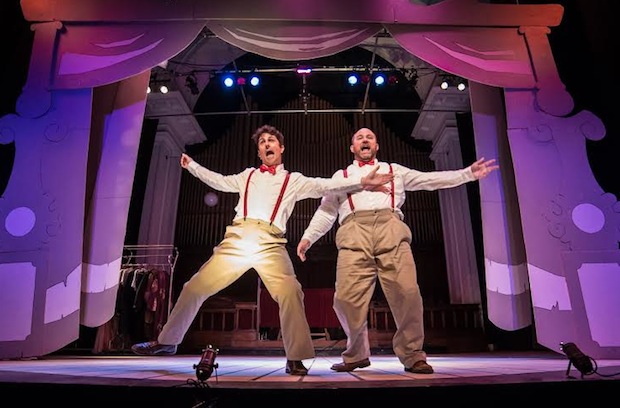
Another way to describe it would be to say that The Wakowski Brothers is a theatrical roller-coaster, showing the ups and downs, not just in the lives of two men, but of a once thriving theatre scene in a once thriving community. It is funny and serious. It is heart-warming and heart-breaking. It is a history that few people really knew existed. I personally was shocked to learn that Cape Breton did, once upon a time, actually have a bustling vaudeville community. Who knew?! Apparently Wesley Colford did. Just as apparent is the love that Colford feels for this particular genre (or maybe just theatre in general) which comes across in this love letter of a play to it.
The title characters—Jim and Conrad Wakowski—were played (this time around) by George MacKenzie and Ron Newcombe, respectively. Lisa Ferguson-Penny played Kaitlyn Rose, the love interest of the story.
MacKenzie is always a powerhouse on stage, known to carry a show, be it a one-man performance (Marx in Soho) or part of a huge ensemble (Fiddler on the Roof). This show adds to that credit. The show runs about ninety minutes. For about 89 of those minutes, MacKenzie is on stage, not just telling the story (or at least his part of it) but also singing, dancing, and throwing his little brother around—all while keeping a close eye on how the audience is reacting. MacKenzie’s Jim comes across as incredibly believable, despite the various ‘characters’ he plays through the show. The emotions—ranging from love to flat-out rage and everything in between—come across as genuine. You can see how Jim’s life has treated him, and you know the man he has become as a result. Part of that comes from Colford’s writing of an in-depth character, but also from the performance going on, not just on stage, but in the mind of the actor.
In contrast to the stronger of the two brothers, Newcombe gives Conrad Wakowski just as much depth, in perhaps more subtle ways. Through the story, it becomes clear that, while they are a team, Conrad is mostly a part of his brother’s team. He is the one who has to wear the costumes, deliver the straight lines, and bend to his older brother’s whims. Newcombe’s Conrad fills this role very well, with a clear sense of pride in what he is doing. He knows he is helping his brother (in more ways than one, you will see) and plays his cards very close to his chest. He gives the character a quiet dignity that could have otherwise fallen to mere clownishness. Conrad’s true character comes across in Newcombe’s eyes when he looks at his scene partners. He may say one thing—pushing the story along, or performing in one of the duo’s many “bits”—but his eyes tell the truth behind each word.
As if there were any more room on the stage, or any more roles to fill, enter Ferguson-Penny’s Kaitlyn Rose. Once could view the character as a plot device, which she is. The story changes greatly after her introduction, and stays a driving force throughout. However, Ferguson-Penny gives Kaitlyn much more than that. She comes across instantly as smart and witty; sharp enough to keep up with the boys, but also real enough to keep them (mostly Jim) grounded. This juxtaposition can be hard to do for anyone, but Ferguson-Penny pulls it off without flinching. She easily held her own on stage against the two powerhouses of MacKenzie and Newcombe; not only that, she often put them in their place (again, mostly MacKenzie) exactly when they needed to be.
Equally important to the performances on the stage were those happening just to the right of it. The band assembled for this production are top-notch, never missing a beat and keeping the pace and tempo (and rimshot) of each section tight and lively. Before the 7pm opening, the band started the show early, at 6:30pm welcoming the audience to the world that The Wakowski Brothers existed in. You were instantly transported to a true vaudevillian theatre by sound alone.
The show is loaded with classic vaudeville schticks (gratuitous violence, misunderstandings, and puns—oh the puns, Wesley!), and song and dance routines that, while they may not make the current top 40, clearly harken back to the age they are emulating. If Colford admitted that he wrote this play with the help of a time-machine, I would believe him.
So, yes, The Wakowski Brothers is, essentially, a play where two men stand on stage and directly tell the audience the story of their lives, while occasionally punching each other. Watching it, however, you will quickly forget that. You become so engrossed in their story-telling that you can see and believe everything they say just as clearly as they remember it.

